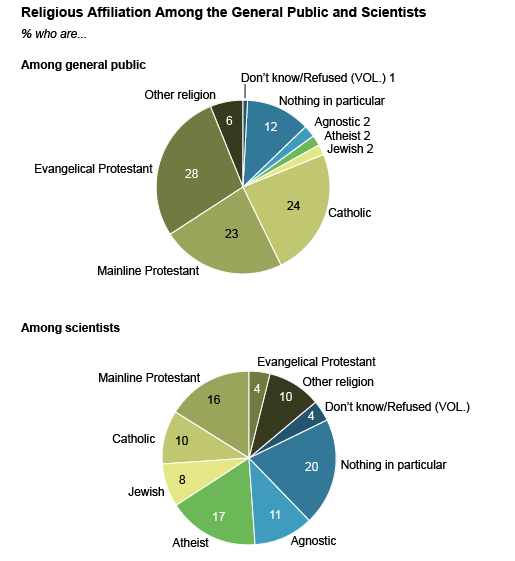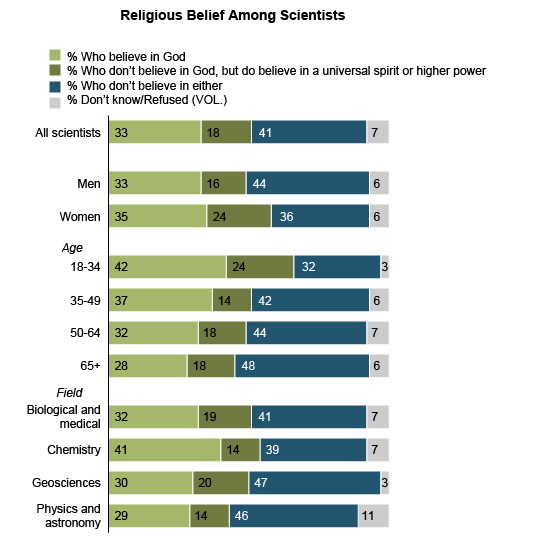Then that means almost just as many does.
But what portion of them were atheist to begin with and having far more motivation to devote themselves to science than to things like religion?
Frankly this 41-45 % means that over half do believe in God. So why are we not asking the question, why so many do believe in God?
That doesnt matter.Also there isnt such thing as “cultured atheist” while cultured christian is
We should expect fewer to believe, and a smaller number of people overall.
…lawlessness will be increased, the love of many will grow cold.
Matthew 24:12
That should give us confidence in the truth of Jesus’ words and could even be encouraging.
That will explain the general decreasing of christians all together i guess
Many people have said to me, if you are a physicist then you must be pretty smart. My reply was that if I were so smart then I would have gone into something which has more jobs and makes more money.
https://www.cheatsheet.com/money-career/employees-intelligence-highest-iqs.html/
There are 7 x less evangelicals in science than in general in the US.
4 x more Jews.
Faith ages out in scientists.
You mean there are nobody who are atheists because they were raised that way? Maybe not in your community but I have met plenty and know of areas of the world where they are the majority.
Even if they are they are so few they wouldnt possibly make the 2% in the demogrphics
In response to this id say high IQ people a less likely to be sheep and their for less likely to follow the general population.
In fact one of the issues I’ve always had with these kind of articles is they only survey the american population. This makes them good for studying religious trends in the unite states but makes them poor for studying general religious trends, which is what they are often used to do, due to sampling issues.
Does the sheep effect make the trend less pronounced or even inversed in the less secular countries countries of western europe for example, well these studies don’t answer that question.
As the diagrams show for the US above:
Religion in scientists declines with age, eminence and distance from physics and America.
why and America ?
My point is I’d like to see more global statistics.
Because only America is that interested in the question. UK results.
Religiosity is strongly correlated with lack of social welfare.
Oh, I love articles like this that have no graphes, as far as I can tell they don’t talk about scientists.
As for social welfare, the correlation makes sense. Traditionally a lot of what social welfare provides today was provided by churches. This isn’t a bad thing by any stretch of the imagination but it does mean that the church has less impact on a duty that was traditionally theirs.
The interesting thing on voting in France at least is the more religious you are the more you are likely to vote right up until you reach the very religious where that trend suddenly inverses it self.
I think the problem is when it comes to politics a lot of policies comes with strings attached. For example if you want social policies to be implemented they often come with gay rights as well, something that a lot of religious people find hard. Some socialist philosophies is also fairly hostile to religions, their is a famous french slogan “ni dieu, ni maitre” that socialist used to use. And to be honest the behavior of some American Christians can be used to justify that hostility which is sad because on most topics socialist and Christians should agree on. In fact it was Christians for religious reasons that carried a lot of the social reforms of the industrial revolution. But the few they do disagree on is to much apparently. And republicans have not only high jacked the those disagreements but have somehow managed to get Christians to hate Christian values.
‘Luckily’ for the LGBTQ+ the religious hostile are in a minority even in America. Even so the suicide rate among the former due to the latter is appalling.
It is important to keep in mind that an atheist scientist often spends their whole life studying the marvels and intricacies of God’s creation and they usually do it with his unwritten Laws on their heart. Maybe they know God by a different name or idea.
Religions are often disseminated as a package deal. If I had to believe every story in the Bible or that Genesis 1-11 was literal history to be a Christian, sadly, I would not be one. Yet a lot of people are of the general opinion that if you are a Christian you must believe the Bible to be true. You read it and whatever it says you believe. I have friends like this.
Inerrancy grounded churches and their vocal members have the real world consequence of making Christians look like complete morons at times. Scientists are trained in rejecting the types of evidence and fuzzy thinking most religious folks advocate as justification for their beliefs. More moderate scholarship is needed to temper fundamentalism and make Christianity more palatable to intellectual audiences. As long as fundamentalists and conservative evangelicals carry the biggest megaphone, and Catholic pew warmers are disconnected from Catholic scholarship, this will not change. Conservative religions often aren’t taken seriously by intellectuals because they shouldn’t be.
My $0.02
Vinnie
That has nothing to do with it though.They can be religious while rejecting stuff that werent meant to be taken literary maybe.
That was my general point. That option needs to be made intelligible to them.
Note that the dataset is " A survey of scientists who are members of the American Association for the Advancement of Science". This is not a general representative sample of all scientists, but a certain elite set. It’s plausible that the set of highest achievers may overlap with appreciably with the ones who are excessively focused on work and neglect other areas. Many scientists are quite ignorant about philosophy and theology, or for that matter about other fields of science besides their specialty. My personal experience as a paleontologist is that quite a lot of paleontologists do believe in God, though not necessarily highly orthodox. Scientists, and anyone else, can be quite smart in one area but not in others. The fact that I know more than almost anyone else would want to about fossil shells from the Eocene of the Carolinas doesn’t mean that I’m smarter than you; I’m sure there are topics that you know more about than I do.
Why do scientists need theology and philosophy to believe in God?

